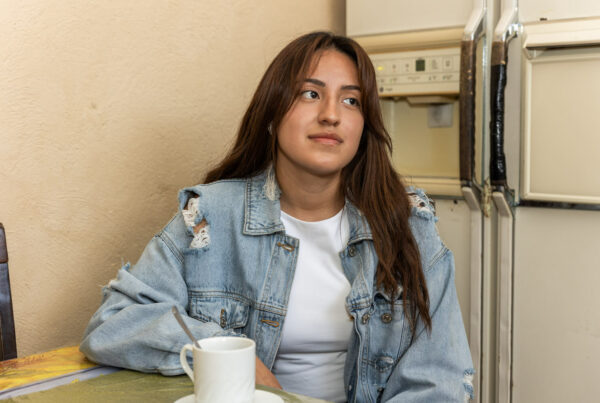Fair trade is a movement that values the freedom and dignity of individuals who make, grow, and supply products to consumers over the cost and convenience of acquiring products in the global marketplace. Fair trade seeks to help workers and producers—specifically in developing countries—achieve better trading and working conditions.1 The movement also promotes sustainable farming and ethical environmental practices.
We love Fairtrade Foundation‘s definition: “With Fairtrade you have the power to change the world every day. With simple shopping choices you can get farmers (and artisans, producers, and workers) a better deal. And that means they can make their own decisions, control their futures and lead the dignified life everyone deserves.”
Why should I shop fair trade?
To fight slavery
Shopping fair trade is a great way for anyone to get involved in the fight against human trafficking. By shopping fair trade, you can avoid fueling companies around the world that profit off of slave labor.
To return dignity to the marketplace
Fair trade purchases provide fair wages and dignified, sustainable employment for individuals in developing countries. By affirming marketable skills and entrepreneurship, you are creating opportunity for individuals who might otherwise be forced into poverty, dangerous working conditions, or trafficking situations.
To protect the environment
The average American throws away 82 pounds of textiles every year. In fact, the fashion industry is the second-most-polluting industry in the world.2 Buying fair trade requires you to be intentional with your purchases, reducing the amount of waste you generate. Fair trade environmental standards are also high—to ensure that what you buy is developed via sustainable methods.
How do I know if a product is ethically sourced?
Having an good understanding of “fair trade” and “ethically sourced” can broaden your options and help you more easily find quality, ethical goods—even if they aren’t specifically advertised as such.
Fair Trade certification
When organizations say they sell fair trade items, they usually mean they’ve received fair trade certification for their products. Many third-party organizations exist to provide routine, rigorous evaluations of companies that sell certified goods. They do this by tracking transactions and supply chains. Two of the most common auditors are Fair Trade Certified™ and Fairtrade International®.
Fair trade certified companies must give a percentage of their earnings to a community development fund that sends money back to the farmers, workers, and artisans. This process helps ensure fair, sustainable wages and safe working conditions.3
Common Fair Trade seals
B Corporation
.jpg)
Ethical standards
Even if a company’s products haven’t been certified by an outside organization, they can still have high ethical standards for their supply chains and business practices. To determine whether a company is transparent and ethical, read their supplier code of conduct. You can also look for a published list of suppliers, and search for a third-party audit from an organization like Know The Chain.
How can I start shopping fair trade?
Are you ready to switch to fair trade shopping but not sure where to start? Here are four ways to transition to an ethical shopping lifestyle—without getting overwhelmed in the process.
Focus on one issue or product at a time
Like any big project, you can’t change everything all at once. It’s okay to make a gradual switch to fair trade. Getting started can be as simple as trading your traditional morning cup of coffee for a fair trade-certified brand or vowing to only shop second-hand clothing for the next year. Once you’re used to one change, you can add another. Eventually, you’ll get to the place where you’re shopping ethically and supporting freedom in several aspects of your life!
Buy less, buy better
Fair trade clothing often costs more than clothes from mainstream brands or big department stores, which means you may be unable to purchase new clothes at the same rate as you have in the past. It’s important to make mindful purchases and only buy what you need—when you need it. Ask yourself questions like, Do I really love what I’m about to buy? Does it fit well with the rest of my wardrobe? Is it made of quality material that will last? Careful buying will help you keep your commitment to fair trade, as well as help reduce the amount of fabric waste impacting the environment.
Shop secondhand
Companies like ThredUp, Depop, and Poshmark make it easier than ever to buy pre-loved clothing. Shopping secondhand is a great way to make sure your purchase isn’t increasing the demand for trafficking or unfair labor practices. This option is also more affordable and extends the life of a product, cutting down on negative environmental impact.
Use the Good On You app
Don’t have time to research every purchase you make? You’re not alone. The creators of the Good on You app have already done the research for you! Search your favorite brands to see how they’ve been rated, based on an evaluation of the company’s policies and practices.
Looking for more inspiration to make the switch? Check out Sarah Lazarovic’s Buyerarchy of Needs, an illustration of the ethical shopping habit mindset. The right tools make it easy to make better shopping choices. Your small, individual purchases will add up, and by shopping fair trade, you’ll be contributing to the fight against slavery—and helping to create a better world.
“Every time you spend money, you are casting a vote for the kind of world you want.” – Anna Lappé
For more content and resources like this, sign up for our newsletter with stories of rescue, human trafficking news, and helpful resources to fight modern slavery.








